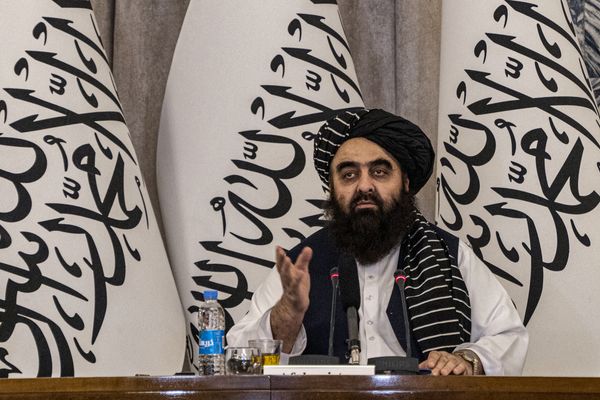
The killing and destruction continues in Gaza, with operations now focusing on southern Gaza, the area those in north Gaza were told to move to when the destruction began. The upper part of northern Gaza now appears to be a wasteland, planed flat, whole neighbourhoods and communities destroyed forever. The same sort of operation is now being applied to Khan Yunis, the major city in southern Gaza. Reports of action are getting scarcer, because so many journalists have been killed, and electricity and internet are so intermittent.
The Christmas period has done the work that Israel’s supporters hoped it would. Though there has been no let-up in the protests — including the fantastic one at Melbourne’s Carols by Candlelight — the slowing of the period, and the sense of a year being ruled off have served to consign this real-time parallel mass destruction to the middle pages, if that.
The widening of the conflict is gaining attention, with the attacks by Houthi ships disrupting the global cargo chain running through the Red Sea and Suez Canal, the possibility of an Israeli incursion into Lebanon, and the widening of the “conflict” into a full regional war. But even these points serve as much for news novelty as for anything else, further distracting from the horrors being visited on the Gazans.
We know that the lack of supplies has started to progress the situation from lack of nutrition to full starvation, thirst and disease. This is Gaza as a ready-made concentration camp on the British Boer War model, where control and killing can be portrayed as occurring as a consequence of events rather than as direct action. According to Al Jazeera, close to 23,000 people have now been killed, and that number will be dwarfed in the months and years to come.
The stated aim of destroying Hamas’ command structure is spurious. Or at least reversed. The structure of Hamas will still be there in some form when the bombing finally ceases. But they will have nothing to command. The level of bombing is clearly tending to the point where the entire Gaza Strip is more or less uninhabitable and unable to be rebuilt as a functioning community. Northern Gaza will, however, be available to Israeli developers to develop low-density beachfront houses and resorts.
One recites all this to remind oneself that this is going on, to try and keep afresh the sense of horror it provoked before the slowdown. For there is the deep urge to let it go, and move on. We are standing up for a people who are running out of the possibilities of any substantial resistance. Some running the pro-Palestine movement are probably energised by notions of decolonisation and global resistance. If that allows them to see more possibilities than I do, and keeps them energised, that’s all to the good. The heaviness of it for many of us is the sense that much of the cited resistance is small-scale, and there is no ultimate solidarity with the Palestinians of any significant heft. Israel’s nuclear capability rules out any real weighing in by a major state actor.
Thus the old context of a wider and global struggle is vanished, and those of us who remember it, however vestigially, can only compare what is happening now with the possibilities — fairly brutal on both sides — of back then. There is a paradox in talking about Hamas as a global threat to Jews. Anti-Zionist struggle by Fatah-derived groups like Black September was waged across the world from the 1960s to the 1980s, targeting Zionist representatives everywhere and not being too fussy about who got caught in the crossfire.
Hamas has always renounced operations outside Palestine/Israel, partly because it does not share the secular anti-imperialism of earlier resistance movements. But more prosaically because there has clearly been a decades-long understanding between Israel and Hamas as to the scope of its operations. Israel has conspicuously left Hamas officials alone in Qatar and elsewhere, despite a long history of foreign soil operations.
But will such a regional containment of the conflict last? One hesitates to raise this question because at the moment the violence is overwhelmingly on Israel’s side of the action. Before Christmas, Zionist groups launched a globally coordinated campaign about rape, mutilation and torture reports and allegations arising from the October 7 Hamas raid, asking why these had been rendered invisible by Western feminists and allies. The obvious answer was that we hadn’t vanished the October 7 attack, Israel had — by mounting a war of torture and mutilation by bombs which dwarfed the atrocities of the October 7 raid.
One hesitates also because pro-Israel Western governments and spy agencies are eager to construct the pro-Palestinian movement as incipiently, potentially violent. That was the import of ASIO’s recent statement that pro-Palestine protests served as a “pressure release” for more militant actions. This cynical, anti-democratic sentiment flew in the face of the scrupulous non-violence of the pro-Palestine movement, and its commitment to building a mass civil movement against Israel’s gangster state violence. (And it seems to be Zionists who may be resorting to violence, with the discovery of a crude bomb outside the house of a pro-Palestine activist in Sydney.)
But in the longer run, I do not see the possibility that there will be no retribution of scale for the destruction of Gaza. The October 7 raid was not Israel’s 9/11. Israel’s 9/11 will be the retribution for what happened after. Should it occur, it is going to be awful beyond measure in its meaning and impact. The simplest way to put it might be that you can put a high-tech “iron dome” over a small country, but you can’t fit a global diaspora underneath it. In the decades when struggle was global, Israel’s leaders had a keen awareness that their actions had consequences beyond their borders. Now many of its right parties are such hardcore returnists that they show a certain disdain for the interests of the diaspora. From an ultra-Zionist perspective, there are advantages to a rise in the temperature and manner of global anti-Semitism.
Many media-active Zionists across the world have become more than a little giddy with delight in their support for Israel’s destruction of Gaza. Understandably thrown by the October 7 raid, the total, literally Biblical response has drawn liberal, reformist, all sorts of Zionists into the Zionist-fascist maw of the Netanyahu-Gvir government. But many have gone willingly, eagerly, perhaps relieved to surrender all the quibbles and difficulties of liberal Zionism. I doubt that few believe that the destruction of Gaza is genuinely about destroying Hamas, with incidental civilian casualties. Many have simply, after years, “made the move” — a wilful surrender to endorsing unlimited violence against a racial enemy, with the surrender of their previous moral scruples presented as the ultimate sacrifice, a demonstration of commitment. The displays of a mix of military triumphalism and wider victimhood have been one of the tougher things to watch and stomach in this whole ghastly passage.
Difficult to stomach because if there is retribution at scale, the switch will be flipped back to victimhood once more, and there will be a disavowal of even the most basic notion of political cause and effect. But it is not of itself, something to give that much thought to. What remains imperative is to keep the destruction of Gaza visible against the deep urge of news to move on. Thoughts of retribution are in part the half-conscious expression of a late hope that there could be some sort of vaguely moral blow against the mass destruction of a people that is not merely horrifically violent, but preening, self-congratulatory, disavowing — see what you made us do? on a vast scale — in a manner particularly hard to take. The hope is forlorn. Should it happen it will most likely be a nihilistic attack one couldn’t possibly support.
But one can say this. Were it to be a major blow against Israel itself, then from Beijing to Santiago people would come out on the street to celebrate a blow against this late imperial decimation of the natives. And I, and many of you, would be among them.







